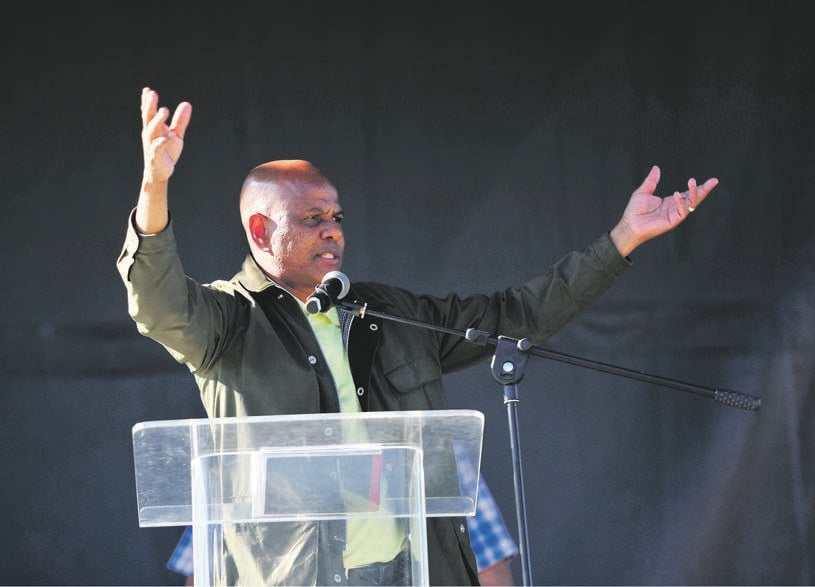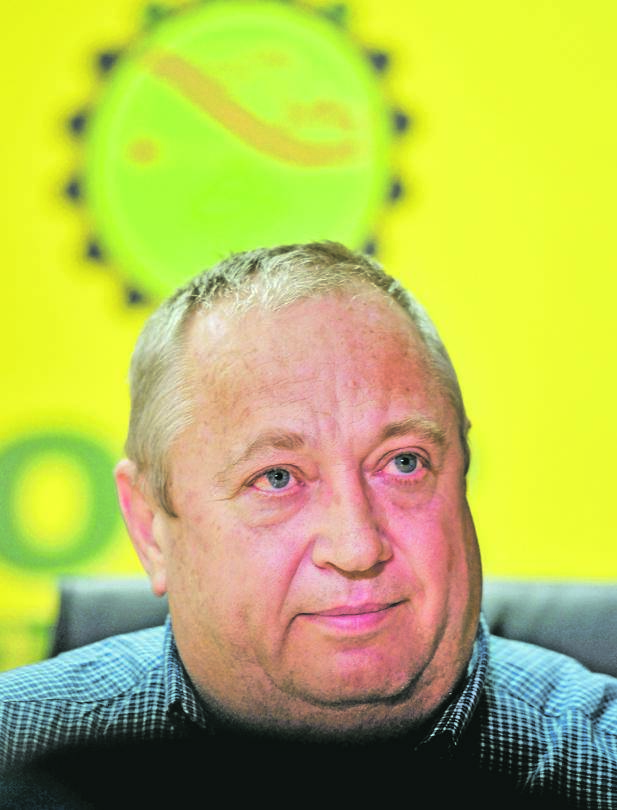
Despite settling on similar terms to rival unions, the Amcu leader insists the protracted stand-off was more about combating legacy than counting costs
The stands of the stadium are packed to capacity. Its grounds are filled with a sea of green T-shirts as the crowd waits to be addressed by their leader on the small stage set up on one end of the pitch.
The blazing sun refuses to be outshone, so umbrellas are opened in their numbers as hundreds more people flock into the venue.
The sight resembles that of a gathering of believers anticipating an address by a bible-punching millionaire pastor, whose well-engineered miracles have earned him the goodwill of thousands of people by show of rands.
There is a notable absence of the informal economy that usually attends such events. There are few traders and even fewer buyers.
Besides a handful of ladies selling boiled corn from little zinc bowls, there is one trader selling chickens, but the dust and the sun have more than feasted on their freshness today.
The man the masses are here for is not a typical, snappy-dressing, religious leader but Joseph Mathunjwa, president of the Association of Mineworkers and Construction Union (Amcu).
And the prophetic announcement they are all hoping to hear is that the wage increase they have downed tools for these almost five months has been granted by the employer, Sibanye-Stillwater.
The wage offer made by Sibanye comprised an increase of R650 a month in the first year, R700 in the second, and R825 in the third year for some categories of employees.
Amcu had demanded a R1 000 annual hike over the three years.
It has been five days short of five months since Amcu members at Sibanye gold mines received a salary, and the mood is anything but jovial.
They have made history: this has been the country’s second-longest-running strike – second only to the 2014 five-month work stoppage by 70 000 platinum workers.
Mathunjwa and the union were also involved in that strike. In fact, after Marikana, the union became the dominant player in the platinum sector.
While awaiting Mathunjwa earlier this week, Amcu members looked decidedly hopeful and pleased, anticipating good news.
Three hours after he was scheduled to address the crowd, Gwebindlala, as Mathunjwa’s loyal supporters have nicknamed him, arrived with his leadership collective.
Loosely translated, Gwebindlala means “he who punishes hunger”. It is the name most of the union members were expecting he would live up to that day.
The meeting, according to the union, was meant to give an update on talks with Sibanye, which had long said it would not cave in to the workers’ demands.
An hour into his address – in which he quoted several biblical verses and bashed political parties and the sector’s new kid on the block, the National Union of Metalworkers of SA – Mathunjwa finally announced that Sibanye had settled.
The deal: Workers would be getting free bus rides back to work from their far-flung homes after the Easter weekend, courtesy of Sibanye; they would get a R4 000 once-off payment and an optional R5 000 interest-free loan from the company, to be repaid over 12 months.
With the roaring excitement from the crowd over the R4 000 ex gratia payment announcement, Mathunjwa asked: “Should we sign?” – to which the crowd gave an overwhelming thumbs up.
The catch: The wage agreement offer that was put on the table five months ago does not change. The company did not budge.
With Mathunjwa having got the go-ahead to sign on the dotted line, both parties held a press conference at Sibanye’s regional office to officially announce the end of the strike.
During the briefing, Sibanye chief executive Neal Froneman, who had flown into the country just two days before, said the strike had cost the company 110 000 ounces (3 118.4kg) in production which, added to other costs, amounted to R1.6 billion.
Read: Court stops platinum workers joining strike
“It is an enormous cost to the people involved, but it is an investment in something in the future. We have learnt a lot on both sides,” Froneman said.
Although the wage deal was signed without changes, the parties also signed a back-to-work agreement, which includes a commitment to conclude a peace pact within 30 days.
The union also committed not to appeal any related court decisions and, along with other stakeholders, ensure that there was a plan to start and ramp up production to make up for the losses.
For its part, Sibanye committed to assist workers with debt consolidation and counselling, and waive its right to claim costs and contributions incurred on behalf of the striking employees.
The company has also committed to subject all employees who were dismissed for strike-related matters to internal disciplinary processes.
Speaking to City Press after the press conference, Mathunjwa said the deal was a win for both parties.
“There were three years signed. The first year is almost done. Remember, we were fighting for the difference. The ex gratia pays for the second year and the other [amount] taps into the third year,” he said.
Mathunjwa said the union spent over R5 million from its strike fund on vouchers for striking workers.
Asked about presiding over yet another record-breaking strike in terms of duration, Mathunjwa said: “We must not be apologetic because we fight a legacy, because our government is failing us. These mines are still paying workers according to the structure of the old Transvaal chamber of mines.
“It is a legacy issue; that is why they prolong. They will protect it at any cost,” he said.
Although Mathunjwa maintained that this was a “win-win deal”, the details of the agreement suggest a different narrative.
Evidently, he did not earn his nickname this time around.
The union and the company will still have to square up against each other against when negotiations in the platinum sector commence. Amcu is the biggest union in that sector and therefore wields considerable power at the negotiation table, unlike in the gold sector.
Froneman said the section 189 process, which the company announced earlier this year and which could see more than 6 000 workers in its gold operations being laid off, will continue.
“These deals signed here do not affect that process. The process is well advanced and Amcu is an intimate part of that process,” Froneman said.
Froneman said the company still did not have a final number of jobs that would be shed, but was hopeful that some job losses would be avoided.
The company announced last year that it would be restructuring because of losses at its gold operations.
 |
| ||||||||||||
| |||||||||||||




 Publications
Publications
 Partners
Partners









